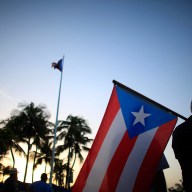OTTAWA – The Harper government has wanted the navy to play a bigger role in battling Somali pirates in the waters off East Africa, but has been stymied about what to do with potential prisoners, documents reveal.
The international effort to contain the pirating of commercial shipping in the Gulf of Aden and beyond is something Canada “strongly supports” and it provides the perfect, low-risk venue for the country to showcase its military ability.
A series of briefing notes, obtained by The Canadian Press under Access to Information from Defence Minister Peter MacKay’s office and the chief of maritime staff, show the eagerness over the last two years to take on a renewed mission.
But the enthusiasm is tempered by the reality that once caught, there’s no place to try pirates.
“While international law provides that any state may take jurisdiction over piracy in international water, counter-piracy efforts off the coast of Somalia continue to be hampered by a lack of authority in domestic laws, as well as by questions concerning jurisdiction over apprehended individuals suspected of piracy and related crimes,” said Nov. 3, 2010 memo to Robert Fonberg, the deputy defence minister.
Aside from the legalities, there is also a hard political reality.
Canada’s land forces grappled with the politically-explosive detainee controversy during the Afghanistan combat mission.
The last time a Canadian warship captured pirates in April 2009, it was forced to release them because of the jurisdictional void. Documents show the government was chastened and federal bureaucrats struggled to address what they termed the “catch-and-release conundrum” of Somali pirates.
Vice-Admiral Paul Maddison, the head of the Royal Canadian Navy, said the problem has yet to be solved.
“Different nations are doing different things here,” he said in a recent interview with The Canadian Press. “And I don’t think we’re going to see a burning desire for an international consensus on a new international legal regime in terms of detention.”
That may be a bit of an understatement.
The nations doing most of the pirate-hunting thought they had it figured out in 2010 when a series of countries signed agreements with Kenya, Somalia’s neighbour in the Horn of Africa, to prosecute captured pirates.
Canada’s deal was signed on January 12, 2010. It allowed for the transfer of prisoners and prosecution under Kenyan law, but less than three months later, the country backed out.
Similar arrangements with China, Denmark, the European Union and the U.S. also collapsed. The problem was Kenyan courts were flooded with suspects and that strained its justice system.
The international community has tried to persuade Kenya to reconsider, without much success. Canadian officials say they might be able to deal with the Republic of Mauritius, a tiny island nation east of Madagascar.
In the run-up to the agreement with Kenya, Canada contributed $740,000 to a United Nations program that helped build a new court to try pirates in its Indian Ocean port city of Mombassa.
Since 2008, Canada has sent six warships to the region and even took a turn commanding the international flotilla that runs the mission.
Maddison said it is important that the international community not let the issue slide.
“My concern is that folks around the world will observe what they have seen … in the Somali basin, and see this as an opportunity for illegal activity,” he said.
The United States has begun bringing captured pirates before its courts, but there is no indication the Harper government is prepared to go down that road, especially since it would almost certainly extend Canadian constitutional protections to the foreign prisoners.
A March 2010 briefing note from the chief of defence staff shows there has been active discussion about deploying a CP-140 Aurora patrol plane to aid in surveillance of suspected ships and the commercial vessels they prey upon.
The navy’s internal debate about legal status has been more intense and precise, according to a briefing given to Maddison’s predecessor, retired vice-admiral Dean McFadden.
“Pirates are not combatants — they cannot be lawfully targeted,” said undated 2010 slide presentation called Achieving Maritime Effect.
“Counter-piracy operations are therefore not combat operations. They are law enforcement type operations.”
The briefing emphasized the need for evidence collection when a pirates are detained. For now, navy orders are to conduct disruption, which means gathering information on suspects, destroying weapons, equipment and ladders.
















